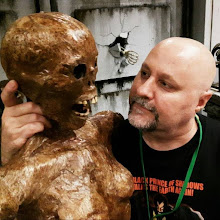Horror taps into primal emotions of fear and disgust that are universal to the human condition, and finds expression across cultures and historical periods. Yet the texts that shape the ways in which horror is broadly understood historically reflect predominantly Anglo-European and American cultural, social, historical and geographical contexts.
Growing awareness and appreciation of the rich horror traditions of other countries around the world, including Japan, Korean, India, Brazil and Ecuador, has highlighted the importance of considering horror in a global context. Accordingly, the Global Horror: Local Perspectives Project provides a platform for exploring the ways in which horror motifs and themes are expressed through the ‘local perspectives’ that inform the creative practices and daily life of particular nations and cultures.
It is not the intent of the Project to exclude Anglo-European and American perspectives from the conversation of global horror but rather to centre other horror traditions which have frequently been de-centred or completely overlooked in the past. The conference therefore offers a springboard for participants from diverse professions, practices and walks of life to engage in interdisciplinary dialogues on topics that include:
- Case studies of un(der)-represented horror traditions in nations and cultures
- How the history, religion, cultural norms of a nation/culture influence local perceptions and representations of horror in literature, film, television, music, art and videogames
- Impact of digital technology on creating and disseminating local perspectives on horror
- How globalisation as a cultural and economic force influences ‘local perspectives’ on horror
- Creative practitioners whose work shapes local perspectives on horror
- Dark humour and making fun of global horror
- Connections between horror in everyday life and fictional horror
- Impact of real or fictional global horrors on individuals (mental illness, trauma, nightmares, other physiological symptoms)
- Horror in religious/spiritual systems (martyrdom, grotesque/monstrous deities, rituals, etc.)
- Social practices associated to horror: cannibalism, (self-)mutilation, abusive rites of passage, suicide, heresies
- Horror in nation-building (slavery, war, genocide, etc.)
- Medical/clinical perspectives: interfaces of horror and medicine; dealing with patients struggling to cope with horrifying experiences
- Educational perspectives: how the curriculum shapes perceptions of horror, its uses and its impacts; horror in children’s stories/horror as pedagogical tool, etc.
- Commodifying horror: dark tourism, etc.
- Technology as agent of horror (weapons, dissemination of fear, etc.)
- How national and international law facilitate and mitigate horror
- Activism as response to horror
- Horror and the media: news coverage, sensationalism
- Horror and space: streets, cities, towns, buildings, deserted areas
- The design of horror: images, branding, advertisement, commercial campaigns involving horror
- Urban legends and local horrors
- Best practice for researching and studying global horror
- Inter-disciplinarity as a tool to overcome the indescribability of horror
The aim of this inclusive interdisciplinary conference and collaborative networking event is to bring people together and encourage creative conversations in the context of a variety of formats: papers, seminars, workshops, storytelling, performances, poster presentations, panels, q&a’s, round-tables etc. Creative responses to the subject, such as poetry/prose, short film screenings/original drama, installations and alternative presentation styles that engage the audience and foster debate are particularly encouraged.
Please feel free to put forward proposals that you think will get the message across, in whatever form. At the end of the conference we will be exploring ways in which we can develop the discussions and dialogues in new and sustainable inclusive interdisciplinary directions, including research, workshops and publications which will help us make sense of the topics discussed during the meeting.
300 word proposals, presentations, abstracts and other forms of contribution and participation should be submitted by Friday 8th November 2019. E-mails should be entitled: Global Horror Submission. Abstracts should be submitted simultaneously to the Organising Chair and the Project Administrator:
Claudio Zanini: haunted32@yahoo.com.br
Len Capuli (Project Administrator): lisbonhorror@progressiveconnexions.net
For further details, visit:
http://www.progressiveconnexions.net/interdisciplinary-projects/evil/global-horror/conferences/
Global Horror: Local Perspectives
An Inclusive Interdisciplinary Conference
Saturday 4th April 2020 – Sunday 5th April 2020
Lisbon, Portugal








0 comments:
Post a Comment